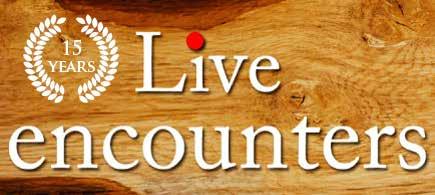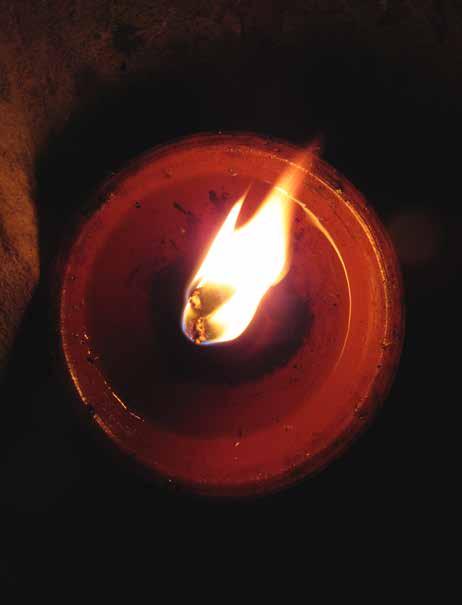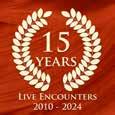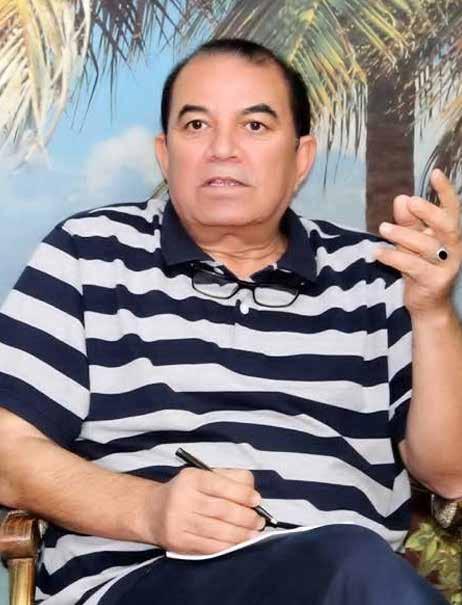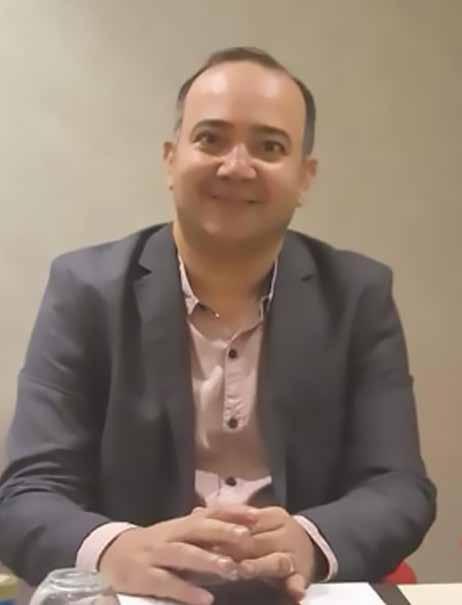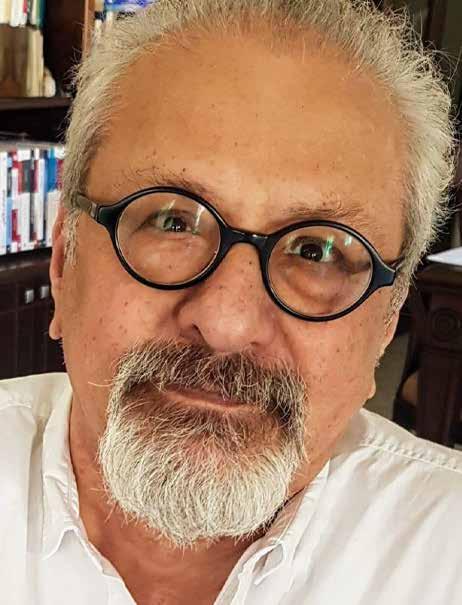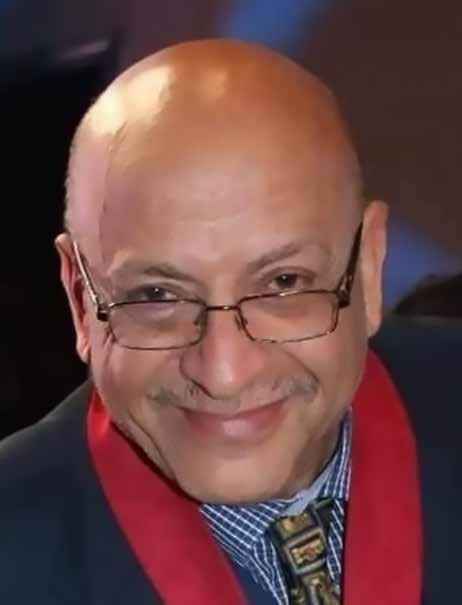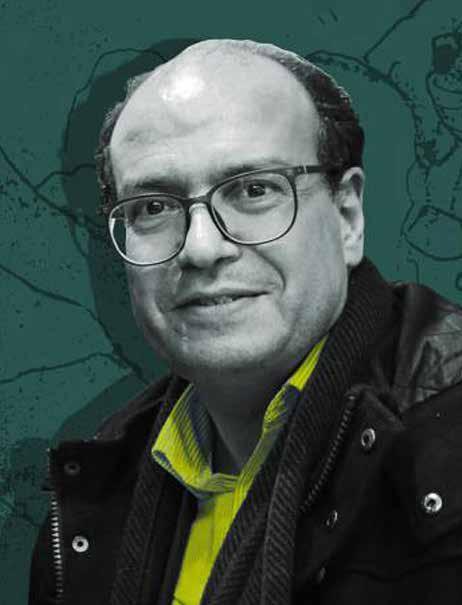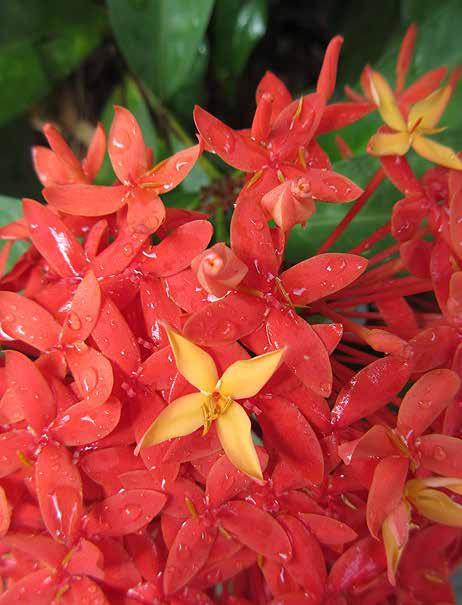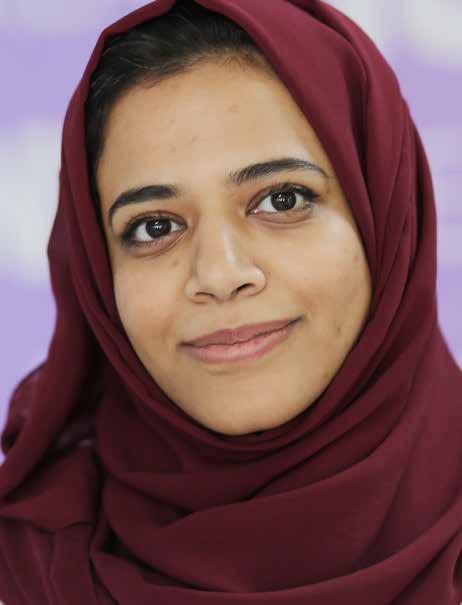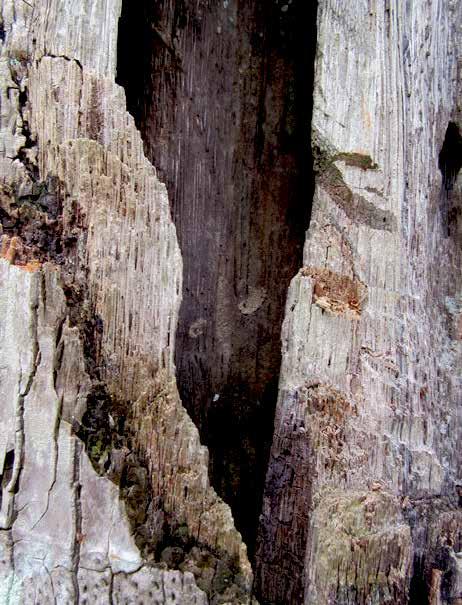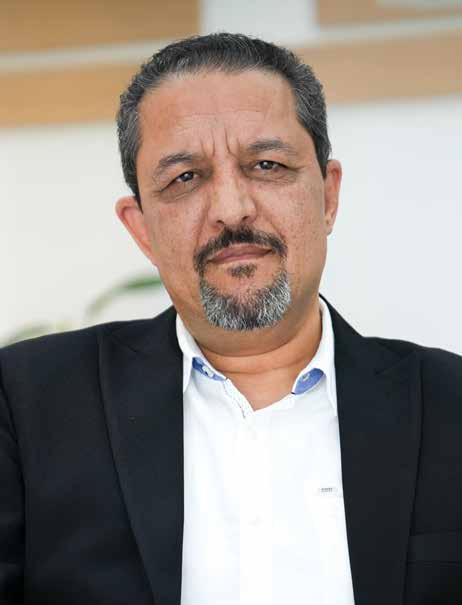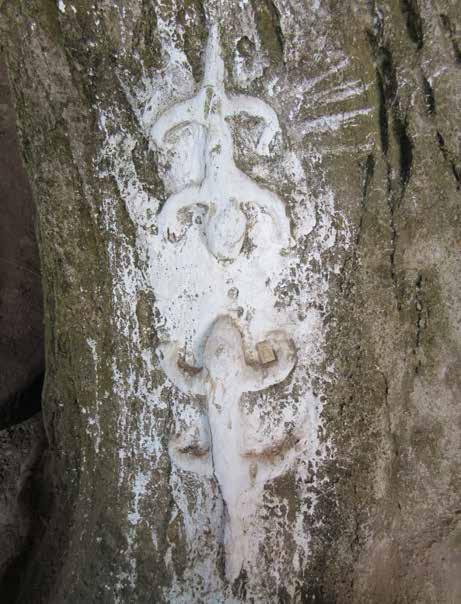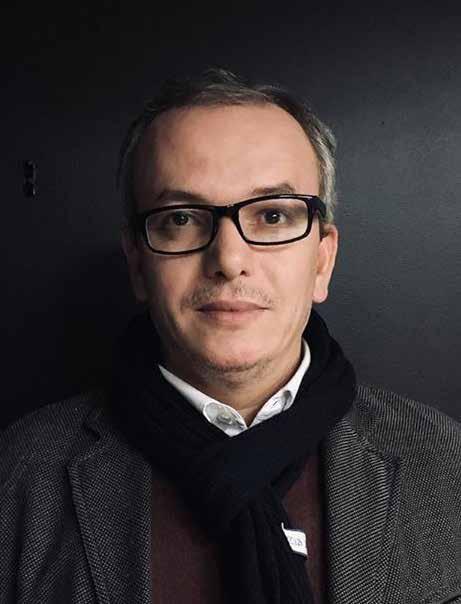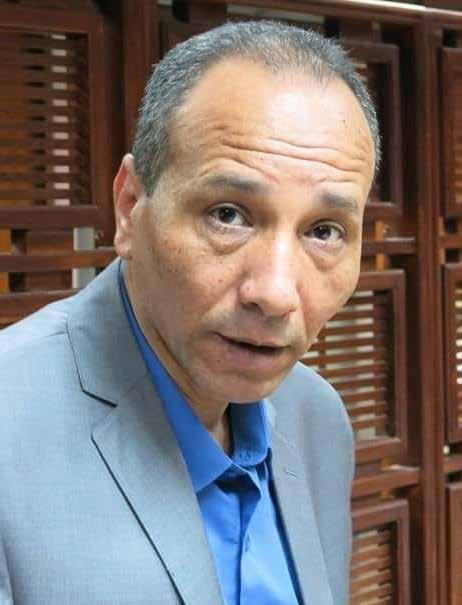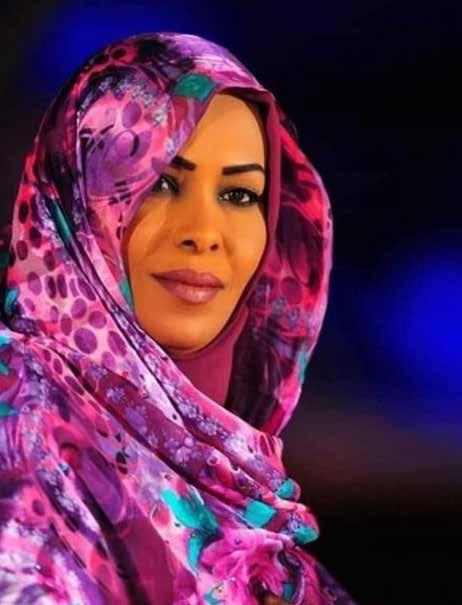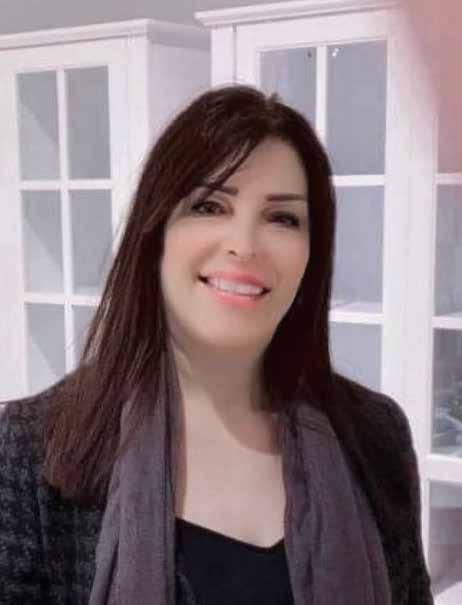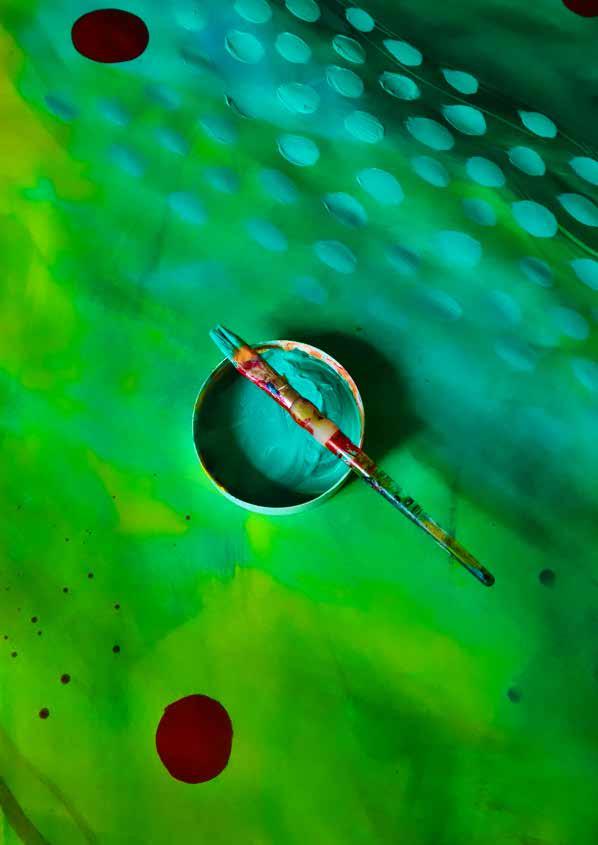Dr Salwa Gouda Taymour, Idris, Haqqi: Architects of the Arabic Short Story
While the Arabic novel commands global attention, the short story has pulsed with a quieter, yet equally vital, energy within modern Arabic literature. Its emergence and evolution are inextricably linked to Egypt, where three towering figures – Mahmoud Taymour, Youssef Idris, and Yehia Haqqi – stand as foundational pillars, each shaping the form in distinct and enduring ways, navigating the transition from romanticism to piercing realism and laying the groundwork for profound social and psychological explorations. Emerging during the twilight of the Nahda (Arab Renaissance), Mahmoud Taymour (1894-1973), often hailed as the father of the modern Arabic short story, witnessed profound societal shifts in early 20th-century Egypt – the waning Ottoman influence, British occupation, stirrings of nationalism, and jarring modernization.
Beginning under the influence of romanticism and European models like Maupassant, Taymour crucially turned his gaze inward, moving beyond exoticism to focus intently on Egyptian society. His stories delved into the lives of the Cairene middle and lower classes, peasants, and the marginalized, capturing tensions between tradition and modernity, rural roots and urban dislocation, bringing new psychological insight and commitment to authentic local reality.
His prose, while formal, sought Egyptian nuances, exemplified in a character’s turmoil in “The Call of the Unknown”: “He felt his soul was a dark abyss, echoing with strange, frightening calls... calls that pulled him towards the unknown, towards a terrifying freedom he could neither comprehend nor resist.” This line captures the internal conflict between societal expectations and burgeoning individual desires, defining Taymour’s move towards psychological realism within the Egyptian context. Elsewhere, in “Aunt Nafisa,” he depicted tradition’s suffocating grip: “She lived as if wrapped in a cloak of ancient customs, each thread woven with the fear of God and the dread of people’s tongues. To step outside its folds was to step into an abyss,” illustrating the perilous cost of defying social norms.
Elsewhere, in “Aunt Nafisa,” he depicted tradition’s suffocating grip: “She lived as if wrapped in a cloak of ancient customs, each thread woven with the fear of God and the dread of people’s tongues. To step outside its folds was to step into an abyss,” illustrating the perilous cost of defying social norms.
If Taymour laid the foundation, Youssef Idris (1927-1991) detonated a literary explosion. A physician by training, Idris brought an unflinching, clinical eye to the raw underbelly of Egyptian life, rejecting the genteel realism of predecessors to plunge into the visceral world of the urban and rural poor with unprecedented intensity. His revolutionary genius lay in mastering colloquial Egyptian Arabic, infusing it not just into dialogue but the narrative voice itself, capturing the rhythm, humor, anger, and despair of the streets and villages.
Idris depicted poverty, bureaucratic absurdity, sexual frustration, political disillusionment, and the sheer struggle for survival with brutal honesty, presenting flesh-andblood characters often trapped and desperate yet pulsating with life and dark humor. Collections like The Cheapest Nights reshaped expectations, proving the short story could be a blunt instrument of social critique and profound humanism from below, crystallized in his iconic line: “He felt that life was a cheap night, the cheapest of nights, where everything was sold: honour, conscience, manhood... and all for pennies.” This stark indictment, devoid of sentimentality and delivered in the raw language of the street, gave shocking power to the voiceless and dehumanized under systemic neglect. His unsparing gaze captured the cyclical despair of the marginalized, as in “The Dregs of the City”: “The child’s bare feet slapped the mud, not running from something, but running toward nothing. That’s how we lived: chasing emptiness,” distilling the crushing futility of poverty. In stories like “The Chair Carrier,” he portrayed resilience amidst brutality: “They broke his fingers one by one. With each snap, he laughed louder. Pain was the only thing they couldn’t steal from him,” revealing defiance as a final refuge against oppression.
Yehia Haqqi (1905-1992) then brought a different, crucial dimension. A diplomat, intellectual, and master stylist deeply engaged with Arabic heritage and European modernism, Haqqi’s short stories leaned towards psychological depth, existential questioning, and consciously crafted, lyrical prose. While capable of sharp social observation (seen in his novel The Lamp of Umm Hashim), he explored alienation, identity, the burdens of the past, and the complexities of the human psyche with subtlety and nuance.
A meticulous craftsman concerned with structure, symbolism, and the musicality of Fus’ha (Modern Standard Arabic), his stories often featured introspective protagonists –intellectuals, artists, civil servants – grappling with internal conflicts and the meaning of existence within modern Egypt. He moved beyond pure social documentation to explore the inner landscapes shaped by those forces, as voiced by his protagonist in “The Postman”: “Who am I? A name on an envelope? A number in a file? A shadow passing through corridors? ... I deliver letters, but who delivers me to myself?” This quintessential Haqqi lament reflects his preoccupation with identity, alienation within the bureaucratic state, and the search for authentic selfhood, delivered with introspective layering and melancholic wisdom. In “The Saint’s Lamp,” he explored faith’s fragility in the modern world through potent metaphor: “Faith, he realized, was not a beacon on a hill, but a flickering wick in a broken lamp – barely lit, easily drowned by the world’s wind, yet stubborn,” capturing the delicate persistence of spirituality. His story “The Empty Bed” rendered profound loneliness tangible: “The emptiness beside him wasn’t space; it was time solidified. Years of silence pressed into the mattress like a fossil,” transforming absence into a palpable, haunting presence.
Together, these giants charted the modern Arabic short story’s course: Taymour transitioned it from romanticism towards authentic Egyptian social realism and psychological insight; Idris revolutionized it with raw, visceral power, colloquial language, and an unflinching focus on the marginalized, proving its potency for radical social critique; Haqqi elevated it with psychological depth, existential themes, modernist techniques, and mastery of literary Arabic, expanding its scope to explore the inner world shaped by outer realities.
They moved the genre from observing society to dissecting its soul. Taymour provided the map, Idris unleashed the torrent, and Haqqi reflected deeply on the floodwaters. Their innovations – the focus on the local and marginalized, embrace of colloquial rhythms, unflinching gaze at social ills, exploration of psychological complexity, and mastery of form – became the bedrock for generations of Arab writers. Their sparks ignited a flame that continues to illuminate the intricate, challenging realities of the Arab experience. The echoes of Taymour’s psychological abyss, Idris’s cheap nights, and Haqqi’s searching postman still resonate in the alleys and consciousness of Arabic fiction today.
Ahmed A’id
Ahmed A’id (born December 19, 1988) is an acclaimed Egyptian poet whose distinguished career includes prestigious national awards. His significant literary output features poetry collections including Green Ash, The Recluse, Time, As Water Describes the Gazelle, I Sip My Coffee... I Rave, Seven Blue Words, That Is My Kingdom, Light and Lethal, A Shadow Guarding Oblivion, and I Don’t See Things as They Are.
Translated from Arabic by Dr. Salwa Gouda.
Grateful and More
I am grateful for things, whatever they may be, For everything has a reason, Even if hidden from me. I let events pass like breaths, What has passed, I bid farewell with utmost patience, And say: “So little remains, Shall I waste it in vain sorrow?!”
I sweep well, sprinkle rosewater On the thresholds, spread my laughter At the door, celebrating what comes, As if I’ve gained nothing to lose. My hands are open and wide, As if I were just created, Unaware of what unfolds.
I am grateful for things, whatever they may be, Grateful... I don’t impose my terms, But expand my thought Regarding my gift. I make space For it to arrive as it pleases. I train myself in the pain of contentment, For contentment is my eternal treasure.
continued overleaf...
I am grateful for things, whatever they may be, I don’t close the window... I open it All my life... a bird will come, A breeze, hope, a song... And if nothing comes, I suffice With light and lamps... I don’t forget the losses; They are my victory delayed once or twice, And an extra lesson with me.
I am grateful for things, Whatever they may be, Even if they don’t come to me.
Photograph by Mark Ulyseas.
©Mark Ulyseas
Ahmed Nabawi
Ahmed Nabawi is an Egyptian poet and academic renowned for his exploration of humanitarian themes in his poetry. He embarked on his poetic journey in the early 1990s and has since published five collections: Testimony of Love, Wounds Have Tributaries, Flames of Questions, Scenes from the Refugee Camp, The Flourishment of Colors and two forthcoming works titled An Ant Said and The Doors Beyond his poetry, Nabawi has authored several critical books, including The Poet’s Culture and the Production of Significance, The Poetics of Small Details, The Contemplative Tendency in Andalusian Poetry, and The Heritage Tributaries in Andalusian Poetry.
Translated from Arabic by Dr. Salwa Gouda.
The Pavement Girl
From too much weeping
And her frightful sorrow, From winter’s bite
On her slender frame, She slept
On the edge of the pavement.
In her sleep, She saw —As they see— A smile
Lighting her face, A lovely breeze
Caressing the dimples
In her cheeks, A noble touch
Gathering her hair, A kiss
On her bare forehead, And a mother’s embrace
Holding her, A tender hug, And brothers, And a family, And a home.
And when passersby stepped on her, Her eyes opened
To a frightful reality. She dried her tears, Gathered her limbs
At the Very end Of the pavement.
The Girl-Mother
Like a butterfly at play, Like a pomegranate flower, Like the breeze of her village, Like a pearl of the sea.
In the warmth of her family, she grew, And in their shelter, She took her first steps beside a brother Treading the homeland. She built him a bridge of tenderness, And stretched out her laughter to him, He flowed into her hand, And walked.
She delighted in his companionship, Savored his words, And he shone among the children. Under a familiar sun, Amidst the gazes of the fields And their whispers, They played together, Racing all day long.
And as every day, She gathered her schoolbooks Into her satchel... in the evening, After reading the words of dreamers, And memorizing the lesson on “Peace,” And memorizing “Good Neighborliness.”
On her soft bed, She hugged her doll, And slept, Like little angels.
But she, Terrified, Leapt at the sound of destruction. Soldiers swarmed like locusts Upon the tranquility of her people. They invaded like Tatar hordes, Spewing hatred through the streets’ mouths, And fire from house To house.
So she gathered herself, Hugged her brother —Dazed— And recoiled, Sought refuge, —As all did— In flight.
They marched them toward the camp, Eyes fixed Upon their village, Staring desolately. And the child, —From terror— Babbled in madness, His eyes searching every face.
He entered the camp, —Resigned— Humiliation branded on his pure brow. And with the mercy of a mother, That hid in his sister’s instinct, She leaned over him, Enveloped him in the curve of her chest, Heartbroken, weeping, Trying to draw him into conversation.
And there, A reporter surprised her: “How did life pass Amidst halos of bullets?” “Life…?
Life is the worst I’ve seen. No savior, No salvation. Nothing remains but fire screaming And ruin.”
The reporter leaned toward them, Brushed dust from his eyes. When poised to ask: Who remained of her family’s tribe? She hugged her brother in defeat, And tears fell From the depths of her eyes.
The Crippled Elder
When the missile struck him, He was repeating: “Your land is your honor, And freedom Is the most precious possession.” When the missile struck him, The earth drank the elder’s blood, And the words Settled in the people.
He was a prisoner of the wheelchair, For it had accompanied him —Since he was a boy— The paralysis of limbs. But his hand Was all their hands, And all legs Were his leg. Since he was small, He found the occupiers at his door. They stole his land, His honor, And raped the dreams of his youth.
Despair did not defeat him, Nor did hope die in his soul. He grasped the sword of words. He kept repeating: “He who has no homeland in the earth, Has no grave within it. Lost is the story,
The dreams, Our remnants — The trace of breaths, A mother’s tears, A father’s tenderness, The tree of affection — Lost are the files of a lifetime.”
He kept repeating: “He who owns nothing becomes owned. He who concedes Becomes worthy of stabs.” He kept fighting with words.
When the missile struck him, He was repeating: “Your land is your honor, And freedom is the most precious possession.” When the missile struck him, The earth drank the elder’s blood, And the words Settled in the people.
Photograph by Mark Ulyseas.
©Mark Ulyseas
Atif Ebaid
Atif Ebaid (born June 17, 1969) is an Egyptian publisher and short story writer, holding a doctorate in Cognitive Systems. He has published several short story collections, including Lady Kaf, Khufu Announces His Conversion to Islam, Samawi, and The Router of the Village Chief. Ebaid is also a prominent figure in the Egyptian and Arab cultural scene.
Translated from Arabic by Dr. Salwa Gouda.
The Router of the Mayor
5,000 sad reacts and 600 comments in less than five minutes flooded the village’s Facebook page after news of Abdelaziz, the mayor ‘s death was posted. Although Facebook doesn’t have a ‘schadenfreude’ reaction, the comments weren’t free from insinuations and jabs at the man’s reputation. Saad al-Tahami wrote: “And before God, adversaries are gathered,” while Umm Shaimaa al-Ghabashi commented: “how long did it last?!” Anyway, the burial was scheduled for tomorrow after Friday prayers at the Grand Mosque in the market. One hour before the call to prayer, the coffin would move toward the mosque, accompanied by the cries of his seven children: Othman and two brothers, along with four daughters, the eldest named Zeinab.
Angry reacts on the death announcement post increased, and more explicit comments accusing him appeared. One minute before the call to prayer, the muezzin announced over the loudspeaker: “Mr. Bakri al-Alwani, in charge of the village Facebook page: Close the comments quickly, Bakri!”
Abdelaziz al-Eisawi was a distinctive farmer in his appearance and dress. It was said his grandfather, al-Eisawi, was the mayor of our village during King Farouk’s time, so people kept calling Abdelaziz “ the mayor “. Abdelaziz always said about himself: “I am a unionist farmer,” and he was quick at any moment to pull out his Farmers’ Union membership card along with a few other party membership cards – some active, others no one had ever heard of.
After the funeral prayer, the coffin moved to the cemetery. As soon as it arrived, the place was packed with a large crowd of mourners, among whom appeared many men from outside the village.
In the evening, the mourning tent blocked three main streets that all converged in front of Abdelaziz’s house in the large courtyard. The entire Eisawi family was at the front of the tent, led by Othman, the deceased’s son. The Quran reciter prepared for a recitation that would be broadcast live on the village page.
The condolence gathering began. Cameras were carefully positioned in the corners of the tent. Behind all this arrangement was Mahmoud al-Eisawi, the son of the mayor’s paternal uncle. He worked hard to make the gathering worthy and qualified him to inherit the title of “Engineer of Funerals” within the Eisawi family, a title exclusively held by Abdelaziz himself for twenty years.
The condolence ceremony ended at 10 PM. Mahmoud al-Eisawi approached Othman proudly and whispered in his ear: “We reached 30,000 views for the condolence video on the village Facebook page. Rest assured, we closed the comments, and everything is fine.”
The mayor’s children gathered in the large reception hall after the gathering – three men and four daughters. The talk was about the need to establish an ongoing charity for the deceased’s soul. After much discussion and back-and-forth... the family decided to install a fast router at the entrance to their house. It would offer free internet without a password. Next to the router, on a plastic sign, it was written: “Al-Fatiha [the opening chapter of the Quran] and prayers for the deceased owner of the router.”
People crowded around the free router. Bustle began around the house: girls, young men, students, employees... and passersby slowed their steps near the router, walking slowly. The constant sound of WhatsApp, Messenger, and Facebook notifications around the house became very normal. Even those who put their phones in their pockets found them connecting to the internet as soon as they passed near the mayor’s house, triggering notifications – vibrating and audible.
The gathering around the house became like a vibrant saint’s festival, lacking only a chanter and swings. The neighbors stopped complaining about the crowds around the mayor’s house because this bustle brought quick prosperity to the surrounding shops, and because the neighbors were also the first to benefit from the free internet. However, the festival around the router began to take another shape. Neighboring houses started renting out their benches to those who wanted to sit within the router’s range. The rent for a single bench varies depending on its proximity to the free internet. Attiyat al-Ghajariyya set up her tea stall near the spot, then a seller of carrots and lettuce appeared, until it evolved into a morning market for the whole village, selling everything until the afternoon.
Then the nature of the crowd changed after the afternoon, filled with university students and employees who returned from work, slept for two hours, then met up in the large country yard, gathered around the router.
The wide area became cramped with the crowds, and the internet speed weakened. Murmurs rose from the people around the router. Then, one dared to knock loudly on the big gate and shouted: “The internet is slow, O sons of the mayor!” From here, the idea of complaining about the weak router developed among the villagers. Even Attiya, son of Umm al-Sa’d (the crazy one), threw a brick towards the iron gate’s glass pane and broke it. Othman, the mayor ‘s son, came out and hit Attiya, then promised to increase the router’s speed, “Not for the sake of Umm al-Sa’d’s son, but so our father may rest peacefully in his grave.” The crowd cheered, and indeed, the internet speed increased, making people happy.
The router’s speed weakened worse than before. Each time, a pane of glass in the iron gate was broken, until the big time came: all the gate’s glass was shattered, and the farmers’ hands reached for the gate’s copper handle. Othman and his brothers came out of the house angrily. A huge crowd gathered around the house with one voice: “The internet is slow, O sons of the mayor!” Othman swore to everyone he wouldn’t renew the internet and would remove the router. The whistling of the boys increased until the district police officer arrived at the mayor s house. He met with Othman and his brothers inside. Zeinab, the mayor ‘s daughter, said:
“We can no longer sleep from all this noise around our father’s router. And we can no longer bear the monthly cost of the internet at this volume.”
The officer replied:
“We are the ones paying for the internet, by agreement with your brother Othman. Your father worked for us as a secret informant, and he wrote us a will stating that he should continue enjoying the pleasure of transmitting village news to us even after his death. So, we thought of installing the router in the large country yard.”
Charbel Dagher
Charbel Dagher (b. 1950), a Lebanese professor at the University of Balamand, is a prominent Arab cultural figure renowned as a bilingual (Arabic/French) poet, writer, novelist, translator, journalist, and scholar specializing in Arabic language, Arabic poetry, and Arab/Islamic aesthetics. Holding dual PhDs, he has collaborated internationally with universities in France, Italy, Malta, and Tunisia. Dagher has published extensively, including numerous poetry collections, novels, and influential scholarly works on Arabic calligraphy, Islamic art history, and modernity in Arabic poetry and language. He has organized major cultural conferences, held key positions like Secretary General of the Arab African Cultural Forum, chaired international art juries (e.g., Sharjah Biennial), and served as coordinator for Léopold Sédar Senghor’s international acknowledgment. His poetry has been translated into several languages and inspired visual art and theatre, while he has also translated significant works of French and African poetry into Arabic. Recently, his poetry book “The River Bathes in Its Own Prose” won the Abu al-Qasim al-Shabi Prize for Poetry.
Translated from Arabic by Dr. Salwa Gouda. continued overleaf...
The river flows in its course
The river bathes in his river
Without sudden unrest
It bathes without finding a towel
But willow leaves
Yet they lie upon it, and it cannot lift its hands
Lacking the lightness of its legs
That crosses the waters without odious waiting.
It bathes, wipes its mouth with its soaked cloth And rows on without relent
As if today were yesterday’s table
With fingers
That trace what happened
With the very same passion
Of the lofty water droplets
Falling
Longing for air
Beyond their own breathless panting in the water chasing water.
The river flows in its course
Like a rush of shoes over the city pavements
It flows as if recalling dust parables, or the sorrows of the wave
It flows, as though the river were a single notebook, with two conjoined pages: One to receive what newly arrives
And another to bid farewell without pain.
The river does not complain It only bathes
As for those panting after their own shadows
They run They complain About last night’s taxes, due the moment sunlight glints off Their sunglasses.
This flowing is unlike what their complaints aspire to. This bathing is unlike what precedes, or follows, water’s sprawl in a feast.
What flows in the river, flows in a poem
Unlike the dust that washes the poet’s eyes in his city.
My River
O my river, Oh myself
A river flows away in its course
This poem Carries me
From myself I drift, while I imagine myself an oar And battle its torrent while I breathe without a metric foot.
O my river, O myself!
I live the river In a river
While I imagine myself pausing, or treading back to what was, to what I was My river
My poem Flowing
Without a stream, without depth: I look at it While the poem backbites me.
O river, slow down!
O my river, dwindling as you descend Slow down!
Settle into a chair soft with grass and color And ponder the air’s fluctuations Before breath fails, You may not bring with you: An identity card Or mobile phone.
The river knows you, even if you soften your footsteps Those sunken, wading steps in its mystery: Let the water’s page caress you with its softness So, you may see the creases of your face The tightening of your features Without an interpreter.
Leave behind what you’ve written Now is the time to speak—without delay, or revision What you’ll say will be fleeting and painful For you won’t have the strength To reclaim it, or erase it.
It is you, as you never were: in its easy crossing Where speech carries its own rupture, splintering, and cessation without epilogue. Your unfinished sentence—now is its time for completion... or to evade its closure.
Do not race toward what distracts you in the radio waves’ games! Do not lose yourself in avoidance, escape, or preoccupations That drown the pictorial music of water!
Now is the time to speak, if you dare utter what sinks into your subterranean currents You are not ready for this final exercise It may not be the final, so long as you can sit And gaze into the river’s mirror as on a feast day.
The river moves on, yet drinks from your spring Bathes in it in the morning’s awakening.
The river does not return Yet leaves enduring traces in time’s formations.
The river is your bed, your chair And the unfinished sentence in a poem.
El Sayed Hafez
El Sayed Hafez is an Egyptian writer born in Alexandria in 1948. After graduating in Philosophy and Sociology in 1976, he had an extensive career in journalism and cultural institutions, primarily in Kuwait (e.g., Al-Seyassah newspaper, National Council for Culture) and later the UAE and Egypt, holding various editorial and managerial roles (e.g., Al-Shasha, Al-Mughamer magazines, Arab Homeland Center). He was a pioneer as the first Arab writer published in English by the UK (7 plays) and Arizona University (5 plays in English, 3 in Arabic), including online publications. His prolific output includes numerous novels (e.g., Nescafe, Plain Coffee), plays for adults and children, TV/radio series, and critical studies. He received awards for playwriting, including for children’s theatre.
Translated from Arabic by Dr. Salwa Gouda.
The Dialogue of the Pine Trees
1
-Dawn did not caress my nose
-And I waited until morning
-Those who rose at dawn -Carrying smiles on their faces
-Scoffing at hardships
-Shackled by the governor’s chains of fear
-No one called me in the morning -And the security office did not call -Try to buy me a pink dress to adorn myself with -I will try, my friend
2 Panorama
Because God does not wish for human hunger, and because you, sweet-talker, sleep in my bed holding my hand, kissing it, caressing my nose... For two years we have not met, nor shaken hands, and the forest is covered in ice... She was like an old child... And you stood at the door of the cold room, your eyes kissing the Eastern sun, Africa’s joy... And we were under the pine tree, tickling the journey of life for our village, defeated in the battle for bread and the secret police files. We wore the stubbornness of the impossible, our hands entwined in defiance, and we crossed the forbidden bridge to the old Sheikh’s house to eat eggs and cheese, listening from his old arghul to the melodies dreaming of the future.
continued overleaf...
3
-I bought the newspapers
-Couldn’t grasp the secret of politics
-And I walked for three hours
-I understand
-I read
-I try
-I try... I try... I try
4 Curtain
In the narrow alley, your father, the tailor, was making a suit for the Chief of Police, his hands trembling. He turned to me and asked about you, saying: “Make him flee the country. Safety is gone inside... And where to flee? How? The city has washed its filthy feet in the river of pollution...” And though he sprays the Chief of Police with perfume, the coming order... “Search for everyone whose face bears a question mark.” Your father washed his face twenty times but couldn’t erase the question mark from his face. And you, my son, here on the shore, throwing stones into the sea’s belly. How many stones has the sea eaten? How many ships have sunk in it? How many, how many... And all people fear it. Try to flee... On a cloud... On a horse... On a boat... On a magazine... On a tree... Try to flee on a beast... Try to get outside the borders and cover your face with your old grandfather’s cloak... And she, leave her, she won’t forget you, though she might forget you and marry another and forget your love and bear an obedient, docile child like the others. And you, try to work in trade, and forget about throwing stones in the sea, about reciting poetry, friends’ talk, and the dialogue about what is and what ought to be. The universe is the universe... But your mind doesn’t believe this.
5
-Do we consult the duck’s eggs?
-What is the end of your white and red dreams?
-What is the end of life, struggle, and debate?
-The duck hatched seven ducklings
The red dream makes bread for the lean years, and the white dream makes a million Sinbads across all lands under the banner of day.
-The end of life is Paradise and Hell... and the end of struggle is evolution, and the end of debate is the inevitability of evolution.
-You sophist!
-Corrupt intellectual.
-Shh.
-Say “Shut up” instead of “Shh,” you fool.
-Things make things.
6 The Act
In the market, the lost son walked searching for his mother... He cried... The vegetable seller began scrutinizing the faces of women walking over the corpses of foolish men.And the man calls out: “Who lost a son?”... The carts jam, the market fills, the child cries, the noon sun scorches the vegetable seller, women haggle over prices, the child cries. A woman stood before him screaming: “My purse was stolen!” and the child calls “Mother!” And you, here inside the market without ID, what’s your name? What city are you from? Why did you come? Your dirty skin, your hair matted with grey dust... The godless heat challenges your faith in endurance, and the voice of an old sheikh cries: “Cow for sale!” From the old man’s hand, a knife emerges. The whole market pulls out knives… They slaughter the cow; women rush for the meat to buy it. And you, who will buy you? Who will sell you? If only they would stab you with their knife... If only they would kill you. If only they knew. And the child searches for his mother... No one knows anyone.
7
-Do you know Dostoevsky?
-Prices are terrifyingly high.
-Do you know the secret of European music?
-My sock is torn, and the city’s belly is empty.
-Oh, ignorant one, dialogue with you is pitiable.
-Do you know what the rent is now?
About the history teacher... about the first inspector... about the head of department... about the Director of Education... about all the headmasters... about the Undersecretary of Headmasters... about the Minister... about the Prime Minister... Khedive Abbas once said: “An ignorant nation is easier to lead than an educated one.”
And the village visited by the blind Sheikh of the Kuttab (Quranic school) who taught... Planted... Reaped... Ate. He didn’t teach us who sowed, who reaped, who ate... And sleep, oh “Arouset El-Moulid” (festival doll), in my lap.
“Yasmine,” my niece, and my son who returned from the Moulid (saint’s festival) sad... because the boat sank at Sidi Ibrahim El-Desouki... And I, who still haven’t understood who sows, who reaps, who eats – though the whole village understands the meaning of these words to this day... From my mother... from our neighbor... from my brother’s wife... from my sister... from our neighbors... from all the women. There is no onion left in the market, no sleep left, nothing left but stewed fava beans... I climbed onto the roof and threw a stone at the dog.
The dog never forgot this... He always lay in wait for us... until he found me alone in the field. He started barking, I started throwing stones at him. I found the dog had a thousand heads... All the heads stretched out around me... They were barking... I fell into the water drain while running, my clothes got dirty, and that day my uncle, Hajj Atiyya, gave me a hot beating... Oh, memories of fleeting days... How did I live in exile when you, my homeland, were my deep wound? And you, oh hour, carrying my memory to me... I woke up to a man’s hand... “Where to?”... “You can’t pass this way.” I walked the other way, the dog’s bark sounding from afar.
Hassan Najmi
Hassan Najmi (born 1960 in Ibn Ahmed, Settat Province) is a distinguished Moroccan poet, author, and journalist. He served as the President of the Union of Writers of Morocco from 1998 to 2005 and was the former head of the House of Poetry in Morocco. Additionally, he holds the position of President at the Moroccan Center for the International PEN Club and serves as the Secretary General of the Argana Prize for Poetry. Najmi played a pivotal role in establishing the House of Poetry in Morocco in December 1995, alongside a group of fellow Moroccan poets. He was elected as its vice-president and spokesperson, contributing significantly to the promotion of poetry and literary culture in Morocco. His literary achievements have been recognized with numerous Arab and international awards, and his works have been translated into more than ten languages, reaching a global audience. Beyond his own writing, Najmi has also translated the poetic works of several renowned world poets into Arabic.
Translated from Arabic by Dr. Salwa Gouda.
The Boy
Night in its white robe
I know not what it came to do by the balcony of drowsiness.
Here – where the boy lay, his hand resting
On a fresh, dappled texture. Here – where a thicket of serpents and night engulfed him, He slept, unaware he touched something black: Like a fist of choking air in the artery, Or like absence near a small hand.
© Hassan Najmi
Cupid
Her child sleeps now – while she rocks him. Her voice is pure, murmuring rhymes and songs. She drapes her braid over the lilies of his face, Voicing no complaint to the cosmos. Her child sleeps in her arms now – while she gazes At his small statue, his quiver of endless arrows. Stars gleam on marble of lamentation. Bracelets, earrings, and enchantment tremble. Princesses emptied their fruit baskets, Crowned themselves, sat exchanging kisses and trills. The house brims with perfumes, incense, and rosewater spray. Candles were lit moments ago.
She knows not why these faces surround her, Nor whence the winged angels came to tend to him.
Her child sleeps now – yet she still inhales The scent turned sour upon his neck. She insists he lives – though buried twenty centuries, Twelve years, six months, and three nights past. Likely she never saw them close his eyes. Still she blankets his slumber with kisses. Knowing Death has a scoundrel’s ambition –She screams at them: “Do not wake him!”
© Hassan Najmi
Photograph by Mark Ulyseas.
©Mark Ulyseas
Huda Al-Mubarak
Huda Al-Mubarak is a poet from the Kingdom of Saudi Arabia. She has published two poetry collections: Intentional Blurriness in Mobile Camera and Slipping. Her texts have been published in various local and Arab magazines and periodicals. Additionally, several of her texts have been translated into multiple languages and featured in international journals, anthologies, and poetry festivals. Her two previous collections are currently undergoing translation and are forthcoming publications.
Translated from Arabic by Dr. Salwa Gouda.
Pillow Letters
I try to laugh without you, I do not know my laughter, I perish from drought when I don’t share the rain with you. The silent letters between us, The interval between memory and longing, Letters that don’t know when to speak and when to be silent?!
The letters you chose to be your companion! Past defeats were nothing but exposure, and delicious naiveties!
Language was never fair!
Sometimes I flee from you, only to fall between dust and water, The desert welcomes Lavender blooms from your kisses, Yet they are merely your beginnings, You plant your fingers in the wall, Until your solitude comes. You find a cheek to kiss! You gift me to the light. You place your heart on the pillow and leave! I find my way from the matching lines of our palms! And much... much laughter.
Life Differently
I show my face to the day It returns to me weary Exhaustion slips beneath my haunted skin. What use is yearning if I find no path to joy?! What use is a lifetime... if its numbers consume me? Life is nothing but... placing one foot before the other, I race the daylight to it I tread the first step.
The girl named Whose fingers are interlaced with the clay of first births, And the agonies of ancestors. When the pages of their lives were palm trees and beauty. And the sweat that built the house! The sound resting between the floor’s cracks Guides me to what I shall become!
I practice life differently I pull the abaya from behind the door. I knock on poetry’s door, before understanding, Before the taste of dates vanishes from my tongue, Before the scent of sandalwood changes in my blood, I practice life differently From ease to fatigue, And from fatigue to toil.
I show my face to the sun It casts upon me tales of passersby, Whispers of shops A plank... a plank Wishes propped against the wall! They slip from between my clenched teeth, The coveted comfort, Too simple for me to ponder!
Warmth
A home
And a poem that doesn’t quarrel with my cracked heart!
A Rustic Tune
I used to think
That life was toying with my heartbeats, And the errors of my conduct. I used to think.
That I was merely a frivolous number Between births and deaths!
And that poetry would shroud me because it grew weary of the Arabic The questions
The rustic and modern tunes!
I have no concern with all this I am a fortune whose birthday coincided with what’s called a star-crossed fate And the union of secret whispers!
My homeland’s choice of me... The crown upon the chessboard of earth!
Had I resembled my peers I would be the mirage,
That the desert drinks without planting any roots from me Or the wave that comes and goes without a shore!
Had I resembled my peers I would have died alone!
And no life would scream hungry before eternal stillness!
My face wouldn’t plant itself upon the wall
Nor would my body become heritage flooring without peer!
Photograph by Mark Ulyseas.
©Mark Ulyseas
Hussein Jelaad
Hussein Jelaad is a Jordanian poet and journalist who serves as the Alternate Editor-in-Chief of Al Jazeera Net. He also holds the position of Jordan’s Poetry Ambassador to the World Poets Movement. Further recognizing his literary talent, he was selected by the Hay Festival in collaboration with UNESCO as one of the best 39 young writers in the Arab world and diaspora.
Translated from Arabic by Dr. Salwa Gouda.
Going to War
1
We go to war
As we go to love:
In full elegance, With passion, With cheers, And pomegranates.
Mothers await us to kiss our fingertips And place henna in our pockets and long hair.
Fathers recite Surah Al-Baqarah, Al-Imran, and Al-Ahzab from the Holy Quran. Children drag behind the coffin: A photo of their father, His kuffiyeh, And his military belt.
2
Ali loved drawing and blank papers, And I loved walking And praying in the Umari Mosque. At night’s end, planes passed over us.
I was at the edge of the camp, seeking water for ablution. A cloud of dust touched the eighth heaven. I ran barefoot—
Tents vaporized. Only a deep pit bore through to the seventh earth. In the morgue, they handed me a bag: 18 kilos of flesh.
“This is your son,” they told me.
continued overleaf...
War is painful, But helplessness is more agonizing— When we see mothers’ clothes beneath the rubble.
I recognized my mother by her witness finger, The hand that glorifies God beneath the chinaberry trees. That same finger waves at me when I neglect prayer or school duties.
“You are your father’s shadow,” she’d say, “And your mother’s father—O light of my eyes.”
I support the house at ten years old, While she, the grapevine over our home.
“Lean on me when weary,” she’d say on olive-and-oil errands.
We fed five children and an old grandmother With what harvesters left behind, Praying to God for protection and well-being.
“When I grow up, I’ll go to the Gulf,” I’d tell her. Her eyes would smile as she pinched my cheek: “When you grow up, the Gulf will come to you.”
Thirty years—and the key remains with the jailer. “Don’t approach the fence,” she tells me, “Don’t make me bereaved twice— Your father’s shirt still keeps the house company.” I began brewing her bitter coffee After diabetes worsened and her eyes turned blue. She laughs: “Return to your children, master of this house.”
Next year, we’ll visit Mecca and the Ancient House. But the key is held by the jailer’s son. Here I am, removing my bloodstained shirt
To cover my mother’s arm
Raised like a flag beneath the rubble.
Mohamad Shoair
Mohamad Shoair is an Egyptian journalist and novelist. From 2000 to 2018, he published five works of literary non-fiction exploring politics, journalism, and social media. Shifting his focus to fiction, he subsequently released the novels Plan 51 (2021) and Sugar Factory (2023). His journalistic work earned him the Egyptian Journalists Syndicate’s Best Political Article Award in 2018. Translated from Arabic by Dr. Salwa Gouda.
The Train
“The train won’t, by God, leave on time!” I shouted amidst my companions at the station, echoing Newton’s famous “Eureka!” cry – but without triumph or joy, only tension and disappointment.
Before uttering it, my eyes – with their annoying habit – had already meticulously scanned every detail around the train inside the station: the supposed last-minute preparations before departure, the elusive iron gates with no inspectors standing by to check tickets, the giant electronic screen whose one malfunctioning slot displayed our train’s number, and the intense seriousness etched on the train driver’s face as he busied himself with tasks that seemed important and urgent, yet all confined within the station. So when would the train leave?!
I let out that cry and didn’t look into my companions’ eyes to gauge their reaction. I leaned my back against a thick column jutting slightly from the station wall, raised my right hand to clutch my head, fumbling nervously until it nearly poked my eyes out.
One of my companions approached, patted my shoulder, and with a calm smile and a soft voice, looking straight into my eyes, said: “It was obvious from the moment we entered the station... I told you.” From the tangled emotions his words carried to me, I chose to feel consolation, not gloating, and reacted. I retorted, spewing the lava of my rapid breaths: “But this means we’ll be late... We’ll be late... We’ll be late!”
As the pitch and intensity of my voice rose with each repetition of the word, it seemed to me that it burst forth in circles of sound waves, rising and expanding, gradually dissipating into the void above the towering station building.
I had a sudden headache. I raised my hand to my head again, turning around amidst the noise. In the distance, to the left, I glimpsed the station door. Remnants of sunlight had stolen through it, looking bright outside.
Mr. Rational
On the metro car, he heard violent explosions from a game a young man was playing on his phone... On the station platform, he nearly bumped into a girl standing there, pouting her lips and taking a selfie as if she were alone... In the street, he saw a woman carrying a bag of tomatoes and cucumbers in one hand and smiling into the phone in her other.
He wanted to stand in the middle of the road... and scream at the top of his voice... saying: “We are idiots!”
But he.... didn’t do it.
He took out his phone... and wrote it on Facebook.
Deaths
By the time he finished his coffee, he had woven his idea... He thought and calculated... How brilliantly he calculated!
Why kill her? Leave her, she’ll die on her own. Relationships impose themselves on your life... Years and years gnaw at you with the sword of your own propriety... They invade you. Rule you. Direct you... And with the weapon of your own morals, they demolish your fortresses... Why kill her? Why stain your hand with her blood?! A period passed, then the newspapers published the news: “Forensic report clarifies multiple deaths caused by suffocation due to toxic gas of indifference.”
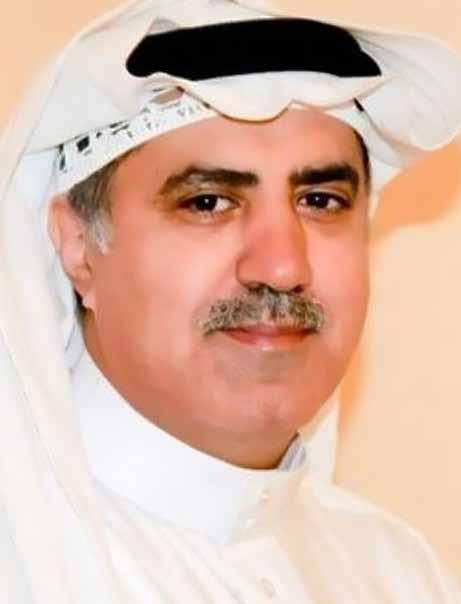
Mohammad al-Domaini is a Saudi poet and writer. He served as an editor for the Cultural Literary Review published by the AlYaum daily newspaper and was later appointed editor of Dareen, a cultural quarterly published in Dammam. In 2010, he became Editor-in-Chief of al-Qafilah (The Caravan), the cultural magazine produced by Saudi Aramco. Four collections of his poetry have been published: The Ruins of Joy (1989), Ears On A Slope (1994), Days Saved by Nobody (2014), and A Bird Missed By Shots (2025). Several of his poems have been translated into English, French, German, and Spanish.
Translated from Arabic by Dr. Salwa Gouda.
Whims
For an Old Friend
His voice reached me after forty years. Between us lay the university, friends, and “Los Angeles,” Between us lay barren lectures, Sunless seasons, And murdered joys. And we left behind us The most beautiful of friends… dead!
O Saeed,
Those ancient Yemeni songs
We left them at the “Night” Casino. All that remains of the singer is his coiffed hair And his pained laughter. As for the cunning women, They abandoned us And went off to hunt their prey.
There was no gold in our lives, O Saeed, Only fleeting pleasures. What remains of the years lived Overlooking the edges of Manfuha, Near “Al-A’sha” Whom Time’s uncertainties harmed, Except light aged like wine, Dogs barking to comfort the dead, And the dead whom no one will wake, And the balconies that were our orphaned palms.
I think of the bus that carried us to university, Of the sleep we carried in our bags, Never knowing That we were stumbling in the wrong waters Waters that won’t be sailed by boats.
Poem of the Dead
Ever since the herds of goats I inherited from my father, I’ve been weaving conspiracies and chasing forgotten tricks just to speak of the dead those we abandon at the last scrape of our hoes.
Those passionate about cracking life’s shell, despairing of a precious life they leave to madmen wading through these wastes crowded with graves and the resentful.
They all die, shrouded in regret for leaving the days they had left to stray cats that lie surrendered to the drowsiness of the evening sun.
Lift with your sunburnt arms this gaunt corpse lightened by labor, the company of animals, and feet stumbling against rocks.
Lift his body high so its sins scatter on the black earth. Cleanse him with the morning rain. There was a heavy cloud blending into his beard, and a faint rustling clashing between his feet.
Lift him to see the fig bushes from above singing his final song. Lift from his chest your nocturnal whispers, and shroud him in the stars that helped him endure time. Plant beside him the surplus of his many days. He worked while they lifted the dirt from his skull. He was abundant, and forgot to grow old.
The Goalkeeper
He prays often, clasping supplication between his hands, And tracing crosses on his chest— twice, three times aware the cameras record his prayers and carry them to his mother’s heart.
The keeper, custodian of empty time, when he strides to midfield, he banishes his solitude from the triangle of fire and casts it among the hooves of frenzied horses.
He is the diamond defense line, and kisses will rain upon him for blocking a sudden goal, and because his brief moment of work will save his team from ruin.
Only the keeper possesses surplus time for contemplation, and perhaps to retrieve his prayers. But the unjust goal will come sometimes in the early minute because the streaking ball disregards empty time and mothers’ prayers.
Photograph by Mark Ulyseas.
©Mark Ulyseas
Mohammed Al-Kafrawy
Mohammed Al-Kafrawy is An Egyptian poet, born in 1978. He has been writing in cultural journalism and literary criticism since 1998. He has four collections of poetry: “A Pink Dream That Raises the Head” (2006), “Shortly After the Dead” (2018), “A Suspicious Place” (2020), and a fourth collection entitled “Scraping Nothingness with His Nails and Giggling,” which is under print at the Egyptian General Book Authority.
Translated from Arabic by Dr. Salwa Gouda.
Auburn-haired and Freckled
One day I loved an auburn-haired girl She was auburn-haired and freckled I saw her as a luminous being In some way or another, I named those freckles “an overflow of the soul” And I called her the Orange Girl
I dreamt she would come to me at night
Unveil the shroud over my heart And fill it with fruits
I waited for her every morning She would wrap me in a bundle And call me to a long journey
I knew she possessed such tricks As would make us own the world Play with it... revel in it... Then curse it and sink it into the earth.
And we’d make a new world every day Out of ice creams and candy dolls And the excess freckles that fell from her face.
Passion
Bring the passion
Bring it all
Pour it into this cup
Be careful not to let it spill
We don’t want anyone tangled in this affair
Living in weather charged with electricity
Only in our intimate moments can we make use of it
Bring the cup of passion close to my lips
I only want to breathe it in
To feel the sweetness of its taste
The softness of its touch
Its hellishly elastic texture
*
Bring the passion and scatter it here on the sofa
Leave us to examine it like a warm stain
Sit before it in awe
As if awaiting the birth of mythical beings.
* Come now
Take my heart
Take my blood and the air from my lungs
Take a piece of my soul
Kneaded with memories and nostalgia
Take all of me
And bring the passion.
I conquered a city of fools with a rusted fist
A trash compactor, Nothing less. Perhaps more.
The stench of living corpses twists through the void, Slick snakes slithering into the soul’s channel, Their heads bruised from static, Their mouths traps for flies and other scatterbrained bugs. They groan in pleasure With every pickaxe blow or axe scrape that levels their limbs. From the grinding of their joints escapes The screech of a door abandoned for centuries. Their bellies are more desolate than ruins.
*
Like a classic villain, Scraping at nothingness with his nails and cackling, Stumbling here and there Hunting for fresh prey Behind this vast hollow.
* Wait a moment I haven’t told you everything. There, in the darkness, Ghosts of the past materialized, Demanding their rightful place for presence. Here, at the cannon’s mouth, They stood cheering, shrieking, and rattling, Begging for the crowd’s fury to ignite, To sink teeth into the flesh of the now.
At the city’s edge, the sun hardened. Seems today won’t pass peacefully. I am the one who unleashed that blaze upon you. I conspired with desert sands To scorch your skins And leave their beloved imprint On every passing body. *
Truthfully, I owned no weapons
Just a tattered cloak and a box of illusions. Yet my plan succeeded: Entire armies fled, Kingdoms collapsed, civilizations crumbled. Here at the crossroads, Where reason sets its traps And leaves newcomers to fall into the snare.
With a rusted fist and a splintered heart, He wanders without clear aim. Was he cutting through streets seeking meaning, Or drifting lost, chasing stray spirits? No one knows precisely. But in the end, He managed to gather every groan seeping from the walls’ cracks, Muster his strength, and strike deep with his fist Down to the guts of lost time. He emerged from the maze victorious, Clutching a giant skeletal frame of a crumbling city.
Photograph by Mark Ulyseas.
©Mark Ulyseas
Mostafa Abada
Mostafa Ebada (born 1965) is an acclaimed Egyptian journalist, poet, essayist, and literary critic. He currently serves as the Deputy Editor-in-Chief of Al-Ahram Al Arabi Magazine and holds the position of cultural advisor for several prominent Egyptian publishing houses, including The Egyptian Lebanese House, Al-Mahrousa Center, and Dar Batana. With a prolific career spanning multiple creative fields, Ebada has authored over 10 books encompassing poetry collections, cultural studies, and literary critiques, solidifying his reputation as a versatile and influential figure in contemporary Arabic literature.
Translated from Arabic by Dr. Salwa Gouda.
Gazing at the Navel
1
In houses of mud and flies Millions are now raised like us And they will become us. Everything for them is a crime, Or, at best, Chronic fear: Woman, God, and travel. They will think every road A trap, Or a snake. That their mothers’ feet Are the end of the world. And when light floods them, They raise their palms in prayer: “Our Lord, do not hold us accountable for what the fools among us have done” Instead of gazing at the navel.
continued overleaf...
2
The matter is very simple:
One of them trusted life too much, And with that same simplicity, It stabbed him. And when he resigned his fate to destiny—compelled— It betrayed him. So he had to end his war With that wretchedness himself. He made a vow: Not to be vulgar, however great the temptations, And to sanctify everything: To gaze long at the breast, the belly, The ankles, and the factory of secrets— For those are their dwellings, Occupied but briefly.
3
I was not with her. I did not hold her hands, Or whisper things she loves: A memory, Or a dewy evening. I was here, hustling in markets, Avoiding death with every step, Every moment, every day, every year. And I know she forgives me. She who saw me tame Camels, like any seasoned chief. She who woke me in winters That killed, And pulled thorns from my feet, And blew dust from my eyes, And said: “Do not forget— Forgetting is a betrayal of pain.” And when food is laid On Thursday / Market day, She spreads her soul, Leaving room for the Creator’s hands.
4
Every night before leaving, I gather a basket of laughter and dreams, Books and my female friends, And their traces on my skin. I place them in the office drawer. I file every feeling in a compartment: This compartment holds my repeated betrayals Of you— Which I deeply enjoyed committing, Spitting in regret’s face Every time. This compartment hides My history and memories of streets I walked deprived and alone. And this one holds the mirrors I prepare for our next meeting: How to laugh, How to appear calm, How to play the madman, And call my sorcerer friends: “Take her hand to the river, Make her revive the old laughter And the old sorrow.”
5
The whole story Is that someone Decided to make his life a text, And his days an inkwell. Then suddenly, his heart flooded: “Beautiful men are more than can be counted, And you are not one of them. You do not blow kisses into the air; If they wink, they are exposed, And the wink turns into deliberate offense.”
6
Long ago, I drew my maps: Your cave is the destination, And sin is but joy Inherited from Adam. I will leave all sorrow To those devoured by hatred And piety— Who wake before everyone, Repeat the same errands, Secrets, and sensual metaphors, Who hate the night. I grudge them elegies, For our surplus ink Maps desire. This is my lap, which the jinn maidens Filled with forbidden fruit every morning. So night never comes But I am suspended On the tree of eternity. continued overleaf...
7
The man who, night after night, Trains his hands in play
On the importance of touch, And separating bones from desire And whose demons come obedient, He learned alone the laws of lament. He missed the maps of imagination As you climbed the tree... so he saw, And stitched for himself from leaves What veiled the whole world from his eyes, Igniting it in his core. He saw your forest, killed by loneliness, Resurrected by the tree, And it lives now In this poem, Which I sent to you, And you did not reply.
And when you said, “Show me How Adam was defeated,” I showed you. When you said, “Enough,” I did not believe—I could not believe. I gaze from that day onward At the making of the world, At the parting of water from land, At maps that belong to me. And whenever I tried to tell you Of my failure, Your forest screamed and sprouted me. The hawks of the earth bit my neck I am the hasty map-reader: Here lie the fats and the maps, Here the fruit and the plateaus, Mountain ranges, Here humanity and harm, The taut armpit, And the birthplace of grief. Why did you place me in this paradise? Why did you make me alone?
Rawda Al-Haj
Rawda Al-Haj is a pioneering Sudanese poet, media expert, and cultural leader, notably Sudan’s first female Minister of Culture and Tourism. She holds advanced degrees including master’s in media and Criticism & Literature. Her significant roles include Head of the Anasi Forum, Founding Editor-in-Chief of Al-Samraa Magazine, and Director General of the Sudanese Foundation for Cultural Development. An internationally recognized, award-winning poet, her collections (e.g., Live for the Poem) have seen multiple reprints and translations. She is the first Sudanese poetess in a Palestinian curriculum and has won prestigious prizes like the Abdulaziz Saud Al-Babtain Award. She currently serves as an expert at ICESCO.
Translated from Arabic by Dr. Salwa Gouda.
Trust
That when people fail you I will not forsake you!
And when old friends depart I will remain
To become a home A field, and shade.
And when you lose your way in darkness I will shine from somewhere Blazing like Truth itself Clear Manifest.
And if they say what you dislike about you Pay no heed I know most Who you are I will sing And proclaim to the universe “No!”
And if the heart is wounded We shall mend it With poems Wounds sewn with poems Are the sweetest!
And if, O my soul, We stray awhile, We shall share the salt and the wound, Justly.
continued overleaf...
I was harsh When I did not say One day, “I love you!”
So, forgive me I was a burden upon you And weight.
Where were you fleeing When I took refuge in my repels Bolted my door And began my long, tedious blame.
Trust That I understand What others do not. So don’t explain to me How often explanation spoils meaning and word!
Trust
That I will love you In every state of your clay: Should it turn to light Or become fire Or return to clay Dying and fading away.
So, forgive me I was late O my soul, so very late If only I had said it sooner!
And I Forgave
Not because your sin deserved forgiveness! And I Pardoned Not because what you committed was trivial Or because my fracture Could simply be mended!
And I Forgot No, I forced myself to forget All that happened in that tale: Thorny Bitter Hard Dark Do you remember?
And I Endured So much that I No longer know How not to endure!
I forgive Because I deserve The vastness of absolution
Purity befits me How could it Not befit me? continued overleaf...
By forgiving, I perhaps freed your soul
But it is mine That is liberated!
I shrouded your heart, my friend In pardon— yet it was my heart Wrapped in its grace!
I granted you beautiful amnesty, Transcending Only to find it In everything that arises: In my earliest sorrows Even in my wound That still drips!
I deserve The beauty of this forgiveness. I resemble it. So, leave silently No excuse pleads No words express.
Wounded is my soul
My heart bleeds
Aching Shattered
I gather the fragments you left me They scatter!
But something in my soul Whenever the path darkens Lights my way Illuminates me Runs ahead Buys me a smile Companions my solitude And with its breeze I am perfumed!
O Girl!
O Girl!
How did you cross this wilderness alone? Who guided you!?
How did you prevail Your hands empty
The desert a desolate night And two exiles nesting At your horizon?
With betrayal And gray companions, And roads riddled with snares.
O Girl!
How did you pass Through what they laid when they conspired? How did you cross The valleys of ruin?
As if the world were an angry tongue: “Beware… Beware…” And the universe mere echo
Repeating after it
As if it spoke of anyone but you!
Yet you walk on, Their chains never broke your stride Their borders never held you captive Their denial never reached you You walk on Certain of the meaning Toward your lote-tree of destiny.
O Girl
You are no prophetess
To plant forgiveness in their wastelands
A cloud that pours rain, not an angel.
O Girl
Where did you buy such patience?
How did you drink it
Bitter again and again And endure the savagery of roads That grew accustomed to your steps.
Here you are in the mirror
Smiling back at me
How have you not changed?? Your resolve still overflows Your face still radiant Your heart is still clear Unclouded
Wherever I see you!
O Girl, How did you do it?
Bless your hands!
Roshan Ali Jaan
Roshan Ali Jaan is a Syrian poet, born in Damascus and residing in Sweden. A graduate of the Faculty of Education, she worked in the field of education in Syrian schools. She has published a poetry collection titled Amber of Darkness, and a second collection titled Requiem of the Rose is currently in print. Her poems have been translated into numerous languages, including English, French, Portuguese, Spanish, Bengali, and Kurdish.
Translated from Arabic by Dr. Salwa Gouda.
Judi*
My soul plunges into the sand
I continue walking towards the shore
Alongside the trembling dawn
God’s wind from Judi
A mountain reciting the grass’s prayer to morning’s face
Cranes leaning into the air
With their verdant sighs
A river yawns..
Propping itself on sunset’s stairs
Here slept the partridge
Here drowned the rose of love in desire’s ecstasy
Sparrows steal seeds from between my bare feet
I waft with the wind, a passionate lily
I gather the foam of hope with two hands of forgetfulness-thorn
I scatter the green, quivering air
I am the traveler on lost ships
Caressing the wave’s caprice for a heart hunting shores
* Judi is Mount Judi, where Noah’s ark came to rest.
Melancholy
The heart trembles, stumbling over details like a basil seedling
And the panting trees like my swaying shadow in absence
Like a hand that returned fingerless from the forums of speech
Like bleeding dreams
Exiles pledge me to weeping
Like the seed of ancestors, longing ignites on my lips
A long night converses with lineages of return
Shedding silver splendor upon the pain of directions
Like an ember soaring with meanings
An eyelid leaning on the desire to weep
The passion of the wounded
That which waves to a fleeing childhood
A voice piercing the dreaming distances
Is what remains for me of melancholy.
Another Day
Like an angel’s shiver, you awaken the grass’s charms
Beside a broken branch defying April
This is an evening for love
I will open a new window for the air
Acacia trees and stars
The bronze handle of the captive door
I whisper the murmur of rain in your ear
Dreams overflowing, and all time is mine
I return to you once more
And in the unique moment, I will embrace the water lily
Before it settles to sleep in the wakeful night
Here you melt with longing in the chalice of the sacred
Drunk am I
And surrounded by the flower of forgetfulness
Cover artwork ‘Phthalo Variations’ by Irish artist Emma Barone

